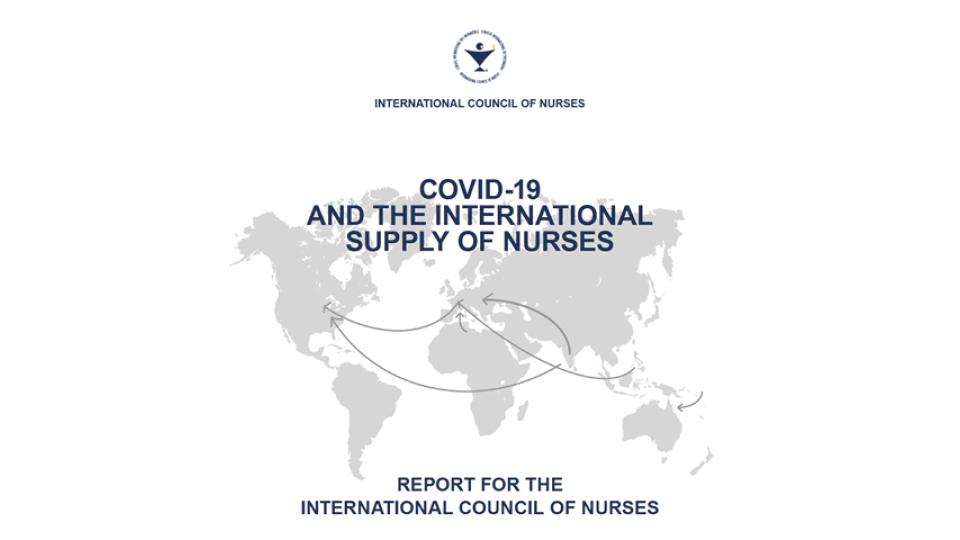ICN launches new report on COVID-19 pandemic and international supply & mobility of nurses

The International Council of Nurses’ (ICN) new report COVID-19 and the International Supply of Nurses reveals the perilous state of the global supply of nurses and how it has left so many poorer states with fewer nurses than they need. It also calls for the implications of the COVID-19 pandemic on nurse mobility to be taken into full consideration.
The report, written by Professor James Buchan, Adjunct Professor, University of Technology, Sydney and ICN Chief Executive Officer Howard Catton, released today, underlines that if high-income countries continue to recruit large numbers of overseas nurses, they will undermine the ability of low and middle-income countries to cope with the virus and dangerously weaken their health systems.
The report argues that high-income countries must train enough nurses to meet their own needs if low-income countries are to have a chance of coping with the pandemic. The world is facing a global shortage of nearly six million nurses, the vast majority of which – 89% - are in low and middle-income countries. The report highlights wide variations between countries in the number of nurses trained every year, which has led to one in eight nurses, approximately 3.5 million, working in a country that is different from the one they were born or trained in.
The ICN report says that unless there is a step change in the number of nurses trained in high income countries so that they finally make progress to become self-sufficient, poorer countries will continue to suffer, lose nurses to overseas jobs, and struggle to meet their own healthcare system’s needs.
Mr Catton said: “Up to one in eight nurses, approximately 3.5 million, are living and working in countries other than the ones they were born or completed their training in. This has come about because many wealthier nations are supplementing their inadequate numbers of nurses with international inflow, which is the antithesis of self-sufficiency.
‘Such gross inequalities in the distribution of nurses is causing harm to countless millions of people, and if it continues, it will make achieving Universal Health Coverage nothing more than a pipe dream.”
Professor Buchan said: “There is a real danger that some high-income countries will revert to their pre-COVID-19 practices of bolstering their nursing workforces by recruiting international nurses, rather than prioritising adequate domestic training capacity, and improving retention of nurses and the attractiveness of nursing as a career. They must ensure that the risk of COVID-19 burnout of nurses is addressed, and provide fair pay and conditions of employment, structured career opportunities, and access to continuing education.”
Mr Catton continued: “The pandemic has shown that nurse shortages are so important that they should feature on countries’ national risk registers. Not having enough nurses is a major risk, not only in relation to the health of the population, but also to the economy, and to societal norms and freedoms.
‘Over the years, governments around the world have talked a good talk about workforce planning and their intentions to make themselves self-sufficient by training their own nurses, but their actions tell a different story.
‘As we know, nursing is an investment which guarantees a positive return on improved global health. And as our report highlights, the best way to guarantee a country has enough nurses is to train and retain more of their own, because being self-sufficient is the smart choice.
‘We are recommending that every country starts using a simple self-sufficiency indicator, based on the proportion of practicing nurses who were born or trained overseas, because it’s a simple method to track and monitor progress on the road to self-sufficiency.”
ICN urges countries to adhere to the World Health Organization’s (WHO) Global Code of practice on the International Recruitment of Health Personnel and make changes to the way they meet their nursing workforce needs.
Professor Buchan concluded: “Without country level policy change focused on investing in their own nursing workforces, pre-COVID-19 trends of increasing flows of nurses from low to high income countries are likely to continue, and the iniquitous mal-distribution of nurses may become more pronounced. This “do nothing” option risks undermining both country level progress towards the attainment of UHC, and the overall global response to any future pandemic waves.”
To download the press release please click here.